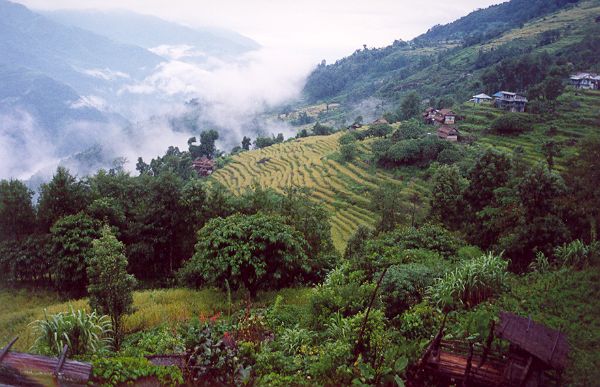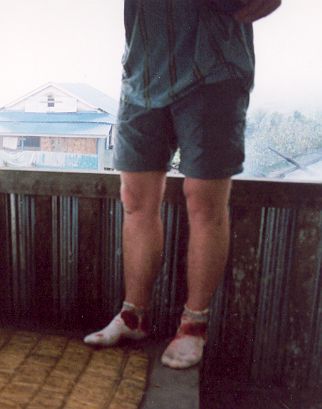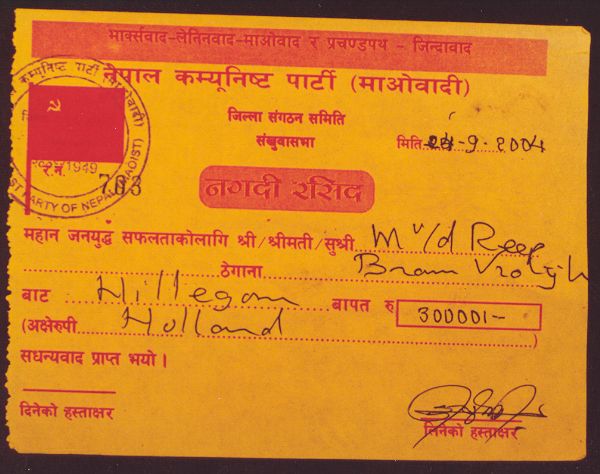Home page: www.treks.org
Table
of Contents "On the road to Kabul and other short stories of treks"
Late monsoon in the Arun
Valley: rain, leeches and Maos (September 2004)

Arun Valley, view
towards the South from Sedua
Summary
Rain all
day, very wet, full of leeches. Must
have picked off a few hundred leeches of my boots and pants. Maoist announced
they will collect the fee for the right of passage tonight. Bit high, we now
pay Rs 4000 or $50 each.
Katmandu
Back in
Katmandu for the seventh time. Mixed feelings, I want to go into the mountains
ASAP.
This may be
the only city in the world where in the down town area the background city
noise is not dominated by traffic but by people voices mixed in with barking dogs and loud roosters, especially
in the early morning. The noise starts already at 5 AM when it gets lights but
is a pleasant wake up call.
Tumlingtar
The
chartered flight for our party of 15 to Tumlingtar from Katmandu left as
planned. The pilots, flying on sight, avoided the patches of tower clouds
rising up from the moist valleys. The
Arun Valley was clear and we landed on a large meadow surrounded by fortified military
posts. Temperature 31 C.
Arun Valley
The first
two days we walked on the East side of the Arun River on the plateau and had
some rain. To the North-West was our mountainous route to Makalu and grey clouds
covered those valleys for most of the day. This did not alarm us.
Late monsoon
The third
day as we crossed the Arun River, it started to rain mildly for much of the
day. Now some leeches came out. I had no bites as I caught them in time when
they crawled up my boots and pants. Score 0 - 8 for me.
The heavy
rain at night forced us to stay in a lodge in Sedua. Bed bugs, presumably
fleas, settled in my fleece inner and kept on biting until we hit the high and
cold camps above 5000 m a week later.
Maos
The fortified
army post of the government was already 2 days behind us and at 5 PM a
messenger of the Maos arrived. After a long conversation, throwing in arguments
that we sponsor medical aid projects, the price went down from 5000 to 4000
Rupees per person. This was the price for friendly nations. Americans had no
price tag as they would be killed on the spot but this is hard to believe. We
agreed we would settle the fee in the next village as we still thought we could
bring it down to 2000.
Monsoon and leeches
The next
day it rained all day and the trail turned into a small stream ideal for
leeches to wait for a victim. They sit on the rocks and low bushes, and you can see them reaching out for a
victim. Passing donkeys had their neck and hind legs covered in blood, a
gruesome sight, by dozens of leech
bites.
There are
two types of leeches, small, up to a cm, and big, up to 3 cm. The latter are
the messy type, very silent and sucking a half cc of blood. Once you find out,
the blood swollen leech should be carefully removed to avoid big blood stains.
That day I
must have removed a few hundred from my boots and pants. I was surprised none
crawled under my pants and into my socks but would find out later.
Arriving at
the lodge, I found 3 bites on my ankles and two on my belly. The leeches were
now dropping off the people, packsacks and rain-coats inside the dormitory and
it took a while to remove them all. Jacco must have had some twenty bites as he
was wearing low shoes.

Leech bites on the ankles of Jacco, over 20 bites
Passage fee for the Maos
At 5 PM two
Maoist showed up to collect the 4000 Rupees for each member. An offer of 2000
was quickly rejected and they walked out but luckily our Sherpa group leader
managed to call them back.

Second receipt of
the payment to the Maos, RS 30000 for 7.5 persons.
4000 Rupees would be paid, US$ 50 each, similar to the visa for Nepal plus trekking fee.
Epilogue
It kept on
raining for another week till we finally reached Makalu Base Camp at 4900 m.
Leeches disappeared above 3500 m but our boots, clothes, equipment and even money remained wet. This
is very unusual in Nepal for late September.
You are visitor #![]() since Oktober, 2004.
since Oktober, 2004.